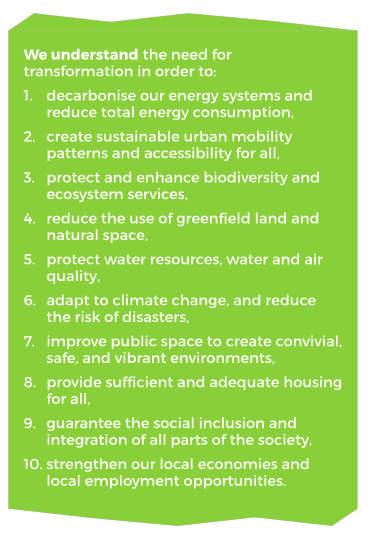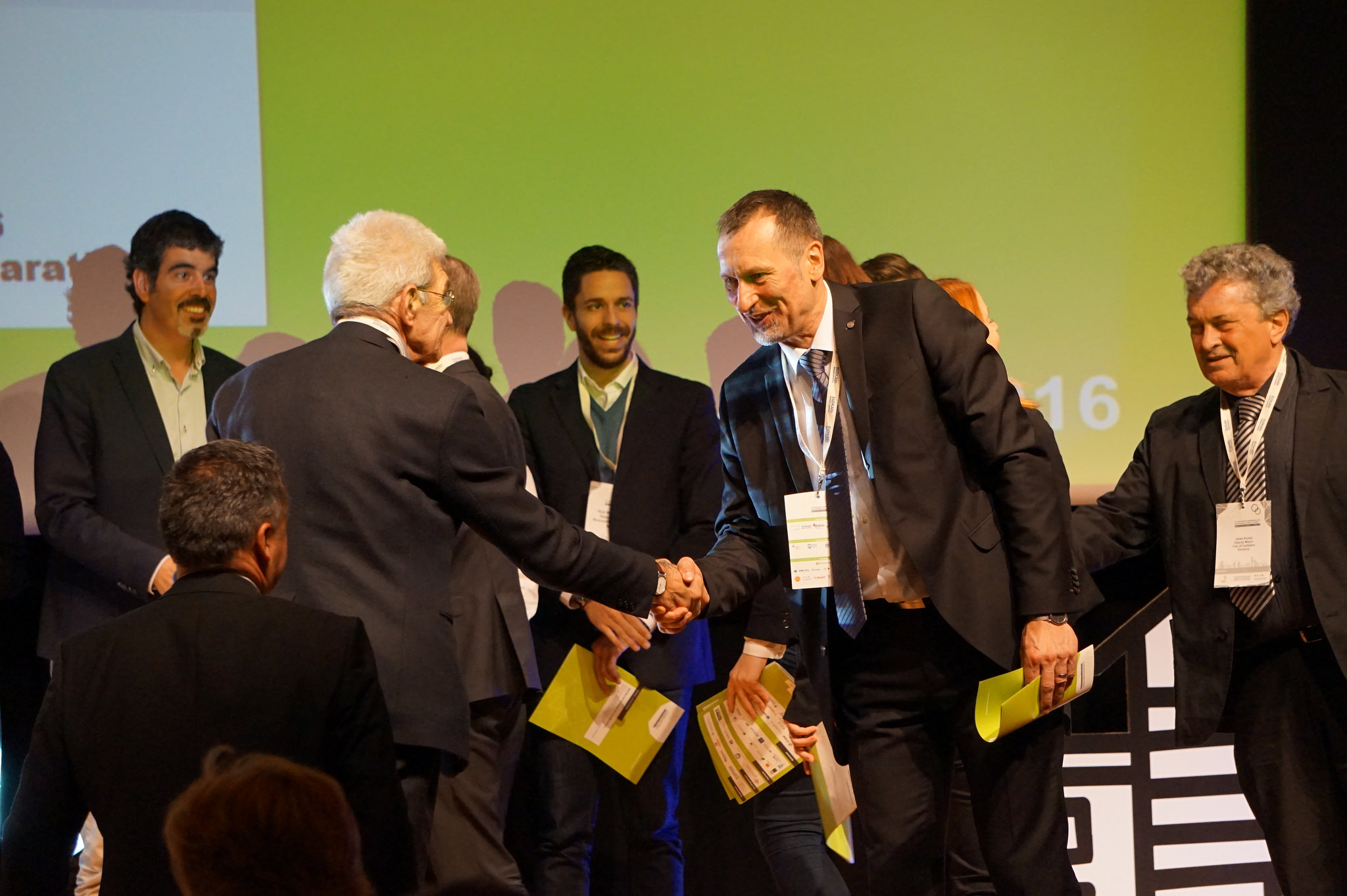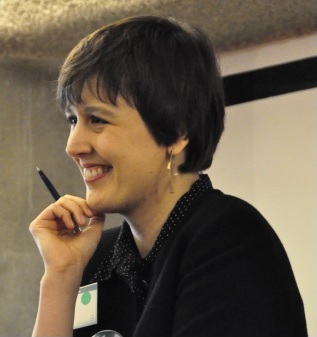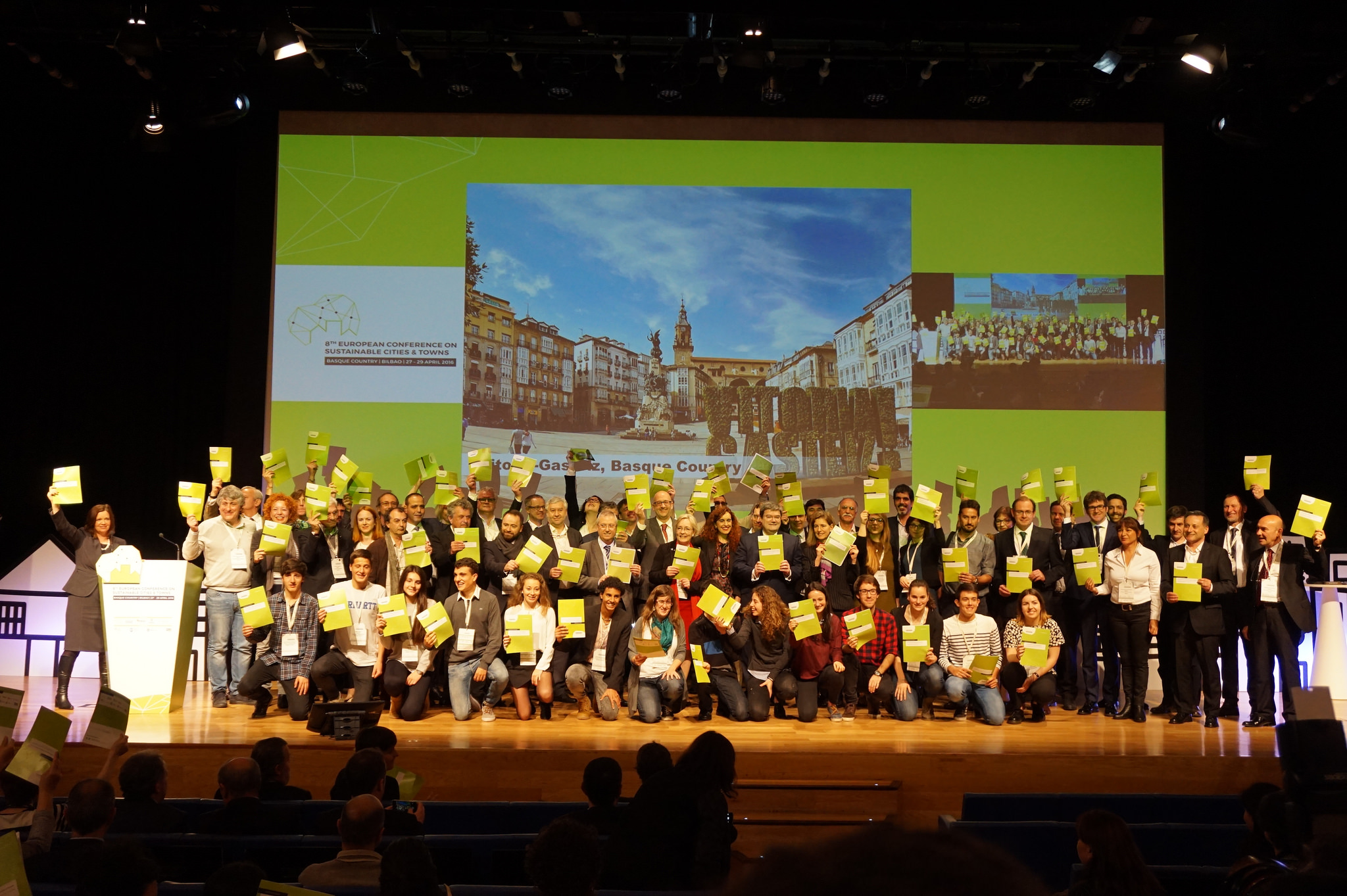#Basque2016: what’s next for European sustainable cities?
Edited on
24 June 2019In the last week of April I have joined 800 local and regional leaders, urban experts, researchers and activists at the 8th European Conference on Sustainable Cities & Towns. Taking place in Bilbao, in the old shipyard converted to a modern, bright conference centre, the event was all about transformation. How have our cities changed over the last decades? How are European and global policy frameworks evolving and what does it mean for the local level? What does it take to be a European, a local leader, a sustainability advocate in the world that is so rapidly changing?
Finally, the big question that inevitably comes at the end of events like this: what comes next?

However, before we talk about the future, let us take a brief look of how we got where we are today. Basque Country was the 8th in the series of European Conferences on Sustainable Cities and Towns, what about the previous ones?
From Rio to Aalborg: a trip down memory lane
First stop: Rio. In 1992 the UN Conference on Environment and Development, also known as the Earth Summit, ended with the global action plan for sustainable development titled Agenda 21. Chapter 28 of this document referred to the importance of local governments as the level of governance closest to the people and called for the establishment of Local Agenda 21 processes, local sustainability strategies developed following broad public consultations.
Next stop: Aalborg. In 1994 European local and regional leaders met at the 1st European Sustainable Cities and Towns Conference to discuss how they can play their part in implementing Agenda 21 and the 5th EU Environmental Action Programme. This meeting resulted in the official launch of European Sustainable Cities and Towns Campaign and adoption of a visionary document known as the Aalborg Charter. Bringing up the notions of social justice, natural capital, global responsibility and citizen participation, it remains one of the most progressive and comprehensive takes on local governance for sustainability.
In the following years Europe has seen the emergence of thousands of Local Agenda 21 processes, often supported by the regional and national governments. Today the Local Agenda 21 label may sound a little dated and only few countries continue to use it. Still, in many cities these processes were early laboratories of public participation, paving the way for the URBACT method and today’s ideas of co-creation and co-production[i].
10 years later the European Sustainable Cities and Towns Conference returned to Aalborg (via Lisbon and Hannover) to talk implementation, following the UN Rio+10 Summit in Johannesburg. Aalborg Charter was supplemented with Aalborg Commitments , a set of qualitative objectives organised into 10 themes.
Both documents have collected thousands of signatures from cities all over Europe and inspired countless activities at and for the local level.
Changing landscape: new frameworks, new complexity
More than a decade since the second Aalborg conference, we are living in a very different world. The importance of cities in responding to global challenges has never been so universally acknowledged. From climate negotiations and Sustainable Development Goals (SDGs) at the global level to the forthcoming EU Urban Agenda on the European level, everybody understands that – as the UN Secretary General Ban Ki-moon stated back in 2012 – the road to sustainability runs through the world’s towns and cities.
In the light of environmental, social and economic challenges facing Europe today, the need for truly transformative solutions is greater than ever. Should you invest in buildings that meet highest energy standards when thousands of people are urgently in need of affordable housing? How to protect green areas and biodiversity if the pressure on land is increasing? Can you force private sector to bear the true costs of natural resources they use if this will translate into fewer work places?
Some of these fears are justified, others are just a myth. What is clear is that to ensure a decent life for all while respecting the limits of local and global ecosystems, one can no longer afford to look at economy, society and environment as if they were islands.
Basque Declaration: pathways towards the future
The Basque Declaration builds on the legacy of the European Sustainable Cities and Towns Campaign, while offering a framework in line with today’s ambitions. It is a political document, aiming to support and accelerate socio-cultural, socio-economic and technological transformation.
The document defines 10 overarching objectives, ranging from decarbonising our energy systems and adapting to climate change to social inclusion and affordable housing for all. Many of these objectives, such as strong local economies, social integration or sustainable mobility, will sound familiar to the URBACT community and other engaged cities.
 Indeed, most of URBACT III Action Planning Networks address at least one of the 10 objectives. While local economy and employment remain key concerns, environmental and socio-cultural dimension are increasingly strongly represented. For instance, the Resilient Europe network is looking at various aspect of resilience, including climate adaptation, while CityMobilNet and Freight TAILS both address sustainable urban mobility. Networks like Arrival or Vital Cities look at social inclusion and integration, focusing respectively on migration and public recreation spaces.
Indeed, most of URBACT III Action Planning Networks address at least one of the 10 objectives. While local economy and employment remain key concerns, environmental and socio-cultural dimension are increasingly strongly represented. For instance, the Resilient Europe network is looking at various aspect of resilience, including climate adaptation, while CityMobilNet and Freight TAILS both address sustainable urban mobility. Networks like Arrival or Vital Cities look at social inclusion and integration, focusing respectively on migration and public recreation spaces.
Certainly, the direction of travel is relatively well known, it is the way that needs to be charted. The Basque Declaration proposes a set of 15 pathways, looking at socio-cultural, socio-economic and technological dimension of the changes needed, and I believe this is where its true value lies. The pathways are formulated as commitments and organized in the following 3 chapters:
a) socio-cultural transformation
The first 5 commitments represent what Eddy Adams called in his earlier article the people-powered policy making. Local leaders pledge to work towards equal access to municipal services and explore new ways of service provision, looking into social innovation and entrepreneurship, collaborative and civic economy and other emerging approaches.
There is also a strong commitment to move from participatory planning to participatory implementation, a shift worth noting, as URBACT will soon embark on a new adventure with Implementation Networks (and yes, you can still apply!).
The call to rethink the boundaries between public and private, also included in this chapter, is interesting, if a bit vague. I would expect to see a stronger wording here, speaking out against privatisation of public services and goods. However, this is partly implicit in the chapter with economic transformation and was underlined by many high-level speakers in Bilbao, including deputy mayors of Barcelona and Paris.
b) socio-economic transformation
The second chapter deals with financial and natural resources, pointing to the importance of local economy, local value chains and local resources. The commitments look at the circulation of resources, both natural (e.g. encouraging development towards circular economy) and financial (e.g. promotion of local and regional currencies).
Local leaders pledge to choose products and services with high environmental performance, not forgetting about social and economic impacts that their purchasing decisions might entail. This was also one of the key themes in Bilbao, with ICLEI celebrating the 20th anniversary of its sustainable procurement programme.
c) technological transformation
This chapter offers a much needed critical look at the dominant smart city discourse, reminding us that it’s local needs that should be the starting point, not the technologies available. The commitments included here emphasize the importance of equal access to information and strongly support open data as a standard to be applied by local governments.
What is needed from the EU and national levels?
Even the most enthusiastic believers in the power of local action (and I would definitely consider myself one of them!) have to concede that cities do not operate in a vacuum. Fully aware that national and EU frameworks can make or break local transformative policies, the authors and endorsers of the Basque Declaration deliver a set of recommendations addressed to different levels of governance. They can be summarised as follows:
- increase horizontal and vertical integration of policies related to urban development,
- create regulatory frameworks that support and accelerate sustainability transition, especially its socio-economic dimension,
- support community-led initiatives and decentralised approaches,
- align political goals and targets with financial programmes and support schemes available,
- work with public financial institutions and banks to make funding instruments more suitable for the local level.
If I had to boil it down to one sentence, it would probably be something like “let us do what we can do best”. Let’s hope that both national and EU regulations can catch up with ambitions existing on the local level (e.g. when it comes to decentralised renewable energy production), in time for global sustainability goals to be met.
What’s next? You decide

Local and regional leaders adopting the Basque Declaration, joined on stage by Basque youth representatives, Bilbao 27 April 2016
Luckily, the declaration does not end with a list of requests, it ends with promises and commitments. The cities declare their readiness to support national and regional governments, as well as the European Union, in implementing the Paris Climate Agreement and UN Sustainable Development Goals. They are also ready to support the alignment of EU Urban Agenda with those global frameworks.
In order to accelerate the transition towards productive, sustainable and resilient cities, local governments and other local representatives pledge to initiate and implement Transformative Actions in line with the pathways proposed. The Transformative Actions will be then documented, monitored and shared with others via the European Sustainable Cities Platform.
Adopted by acclamation at the 8th European Conference on Sustainable Cities and Towns, the declaration is open to further endorsements Cities, organisations and indviduals who support the messages of the Basque Declaration are encouraged to publicly endorse it and – most importantly – use it as a source of inspiration, mobilisation and action.
What will the next chapter in this story look like? It’s up to you.
Don’t forget to check back regularly on the progress on URBACT networks working on related topics: transformative actions are best planned and implemented with peers.
[i] For those of you that feel like digging deeper into the Local Agenda 21 story globally I have co-authored a report on 20 years of local sustainability that you can download for free here.
 Submitted by Ania Rok on
Submitted by Ania Rok on





